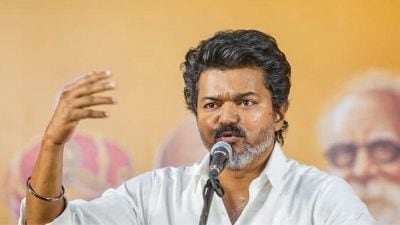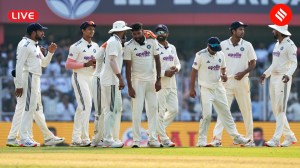‘Conflict and hatred is slowly destroying both India, Pakistan’
Stephen P. Cohen is a Senior Fellow at the Brookings Institution; the author of many books on South Asia, including the recently published I...

Stephen P. Cohen is a Senior Fellow at the Brookings Institution; the author of many books on South Asia, including the recently published India: Emerging Power, he is currently working on a book on the future of Pakistan, and has made several trips to both India and Pakistan in recent months. He was interviewed by SONIA TRIKHA on the current India-Pakistan standoff:
Don’t you think with Al Qaeda hiding in Pakistan, Musharraf’s promise of helping the global coalition is coming a cropper?
This is an exaggeration. Pakistan’s strategy has been, for years, to turn over just enough terrorists and ‘wanted’ individuals to please the US. They seem to have a very large supply of these characters. Of course, they will not oblige India, which New Delhi must have realised when it made its demands for the list of 20. Pakistan will continue to cooperate with the coalition, especially when the militants have embarrassed it or operated against the army’s interests, but these groups are very deeply embedded in Pakistani society, a number of them were supported by the government — including civilian governments — and Pakistan will require a powerful incentive before it decides to purge itself of these militants.
How should India respond after the spate of attacks by Pak-sponsored militants?
India’s strategy has been to practice ‘compellence’: it threatens to use force unless Pakistan obliges it by turning over people on the list of 20 and/or stopping infiltration along the LOC. Having made the threat, India must carry it out if it is not satisfied. I fully expect some Indian military action in the near future — unless Washington can persuade the Pakistanis to comply with India’s demands.
But must Pakistan comply with all of them? Would it be satisfied with 15, or 10? How do we know when Pakistan’s support for the militants is declining? What if it turns out that Pakistan cannot completely control these groups? It is likely that these groups are trying to embarrass Musharraf himself, and even provoke a war between India and Pakistan, or at least further anti-Muslim riots in India, thus demonstrating the ‘contradictions’ in the situation.
I think this is the time for Indian statesmanship. It has nothing to gain from an inconclusive military strike that will only alienate the international community, and make it harder to come to an eventual dialogue with Pakistan. The problem is that India has gone out so far on the limb of moral indignation (albeit with some good reason) that it has lost its sense of strategic purpose — which should be to detach Pakistan from China by offering proposals that meet vital Pakistani concerns but do not compromise vital Indian ones. This is what Indians should be talking about, not bluff and bluster about retaliation and nuclear war.
What is the best and the worst case scenarios in the current Indo-Pak standoff?
The best case: American-led international intervention that would deal with the basic concerns of both India and Pakistan (and the Kashmiris). This would be the initiation of a process that would 1) get the two sides back to the negotiating table, 2) end infiltration and terrorism, and 3) begin the political process in Kashmir — on both sides of the LOC. I have said, since 1992, that India and Pakistan are incapable of normalising their relationship by themselves, and that they will be locked in permanent crisis (verging on, or going over the edge to war) for years. Personally, I am sorry that this prediction has turned out to be correct. Their conflict and hatred is slowly destroying both countries.
Do you think Musharraf is doing a Yasser Arafat on India in allowing terrorists to operate even while they are ostensibly under arrest?
Yes, I think this is Pakistan’s strategy. It is motivated in part by hatred of India (revenge for 1971). Among Pakistani moderates, frustration with India. New Delhi has not wanted to negotiate Kashmir when there was no crisis, arguing that things are peaceful, and it won’t negotiate when there is a crisis, arguing that it won’t negotiate under duress. The Israelis were willing to negotiate, and did, but Arafat backed down from an agreement he should have accepted; if India were to make an offer to Pakistan that protected vital Pakistani interests, and enhanced the security and livelihood of the Kashmiris, then the international community would join India in putting pressure on Islamabad to accept it.
Do you think it is possible to do a limited strike against Pakistan without a nuclear conflagration?
Anything is ‘possible’. The issue is what is the probability that such an attack will not lead to a Pakistani counter-attack, then a further Indian strike, and another Pakistani response, and so forth. Each time this happens the opportunity for misjudgment increases greatly. Given the past behaviour of Indian and Pakistani governments in a crisis, I would not want to be living in either Islamabad or Delhi, or any other city that would be a likely target for a nuclear strike. Also, after the phony referendum, the slaughter in Gujarat and the terrorist attacks in Jammu (and Karachi), I would double or triple whatever probability I might have assigned to the likelihood of a war four months ago.
You claimed India is an Emerging Power. Is this being threatened by the internal dynamics of Indo-Pak tensions and the events in Gujarat?
Sadly, if there was to be a ‘decade of India’, it has only lasted four or five years. The book argued that India was an emerging major state, but it also pointed out the obstacles to India’s emergence, and noted that India was undergoing several simultaneous domestic revolutions, including a struggle for the very idea of India. I would still stick to my major conclusions but were I writing the book today I would not be quite so upbeat. Gujarat has set India back morally, politically, and economically. The only bright light is that the terror has not spread to other states. Both the state and the Union governments are derelict in their duty but the press, including TV, has demonstrated that Indians remain secular.
Additionally, India’s economic performance has been very disappointing, and the second wave of reforms is yet to occur. The world sees India as a bad place to invest in, and soon they will see India as a bad place to travel to. I would not be surprised, especially if there is an inconclusive war, that some American strategists come to see India as a bad country to ally with.
Given the political situation in Pakistan since 9/11, and after the referendum, what is the future of Pakistan?
I wish I knew — my book’s working title was originally ‘Pakistan: Misdirected State,’ which I thought captured the way in which Pakistan has drifted from Jinnah’s goal to establish a democratic, liberal, Islamic republic that could live in peace, albeit separately, from India. However, after Musharraf’s speech of January 12, the working title was changed to ‘Pakistan: Redirected State,’ since he had laid out an agenda which would have put Pakistan back on the rails. Now, I am not so sure. He’s had five months to do something, and notwithstanding his personal intentions, he is limited by his own training, his recent history (as the man who plotted the hugely miscalculated Kargil operation) and by the army’s institutional and ideological constraints.
I once suggested that Musharraf might be Pakistan’s Shastri — a mild man who rose to the occasion; there’s still hope, of course, but might he not turn out to be a Yahya Khan — the man who lost half of his country?






- 01
- 02
- 03
- 04
- 05

























